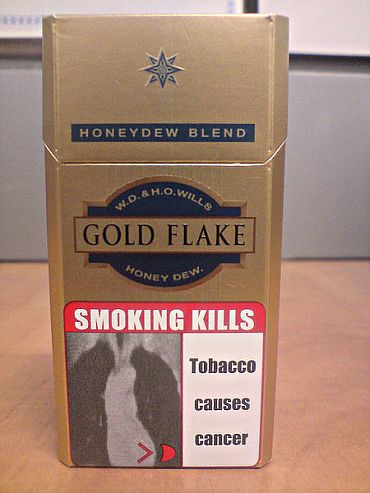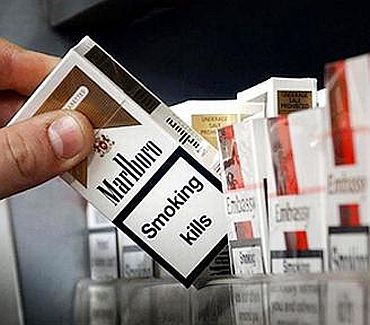The current pictorial health warnings used on Indian tobacco products are ineffective compared to the pictorial warnings mandated in 2006 and present international health warnings, as per a recent survey.
Among the different types of tobacco users the percentage of tobacco users who either read or looked at the warning labels was low compared to other countries, according to national survey conducted by Healis -Sekhsaria Institute for Public Health, an anti-tobacco advocacy group.
It was found that only 20.6 per cent of cigarette smokers, 15 per cent of bidi smokers and 13.2 per cent of smokeless tobacco users either read or looked at the warning labels while this was reported as 91 per cent in Canada from a survey conducted in the year 2000.
During the study, three sets of pictorial health warnings -- current, mandated in 2006 and international pictorial warnings were used.
...
Graphical warnings do shock smokers but...
Around 68 per cent of respondents were very alarmed when it showed graphic image of surgeons operating a heart with a text message 'smoking clogs the arteries and causes heart attacks and strokes', and 53.3 per cent of the respondents wanted to quit after seeing this image.
The survey also found that 65 per cent were alarmed when they were shown the graphic image mandated in 2006 depicting a grotesque picture of oral cancer with a message 'Tobacco causes mouth cancer' and 48.6 per cent wanted to quit after seeing it.
Further, a study found that 58.4 per cent were alarmed when they were shown an explicit pictorial warning mandated in 2006 that depicted pictures of a patient with post surgical cheek with a text message 'Tobacco causes slow and painful death' and 47.8 per cent respondents wanted to quit after seeing it.
... only a few wanted to quit
When the currently mandated pictorial warnings depicting graphic image of X-ray lung were shown, only 36.7 per cent were alarmed and 40 per cent of the respondents wanted to quit after seeing it.
After showing the pictorial warning depicting a scorpion, only 36.7 per cent were alarmed and a mere 30.8 percent wanted to quit after seeing this graphic image, it said.
When the graphic image depicting a diseased lung with the warning 'Tobacco causes cancer' was shown, only 41.4 per cent of the respondents were alarmed and 30 percent were motivated to quit after seeing the image.
Dr Prakash Gupta, Director of the institute, stressed the need for government to replace the current pictorial warnings. The pictorial warnings on tobacco products in other countries were very explicit and really sent the desired message to the smoker, he said.
In India, pictorial warnings don't deter smokers
"Smoking rates have significantly reduced in countries such as Brazil and Mauritius, which printed gory images of mouth cancer on cigarette packs. After their introduction, the tobacco companies in those countries had reported a decline in sales," he added.
Nationally representative survey of 1,700 rural and urban adults (users and non users of tobacco) aged over 18 years from eight states of four regions (North, East, South, and West) across India was performed.
The study sample included 680 non-tobacco users and 1020 tobacco users. The primary objective of this survey was to assess awareness of the current health warning labels in India and their effectiveness in communicating health hazards of tobacco use.
The survey used aided recall research technique by showing 11 pictorial warnings (in a flip chart) to the respondents to assess the effectiveness of the warnings.





article